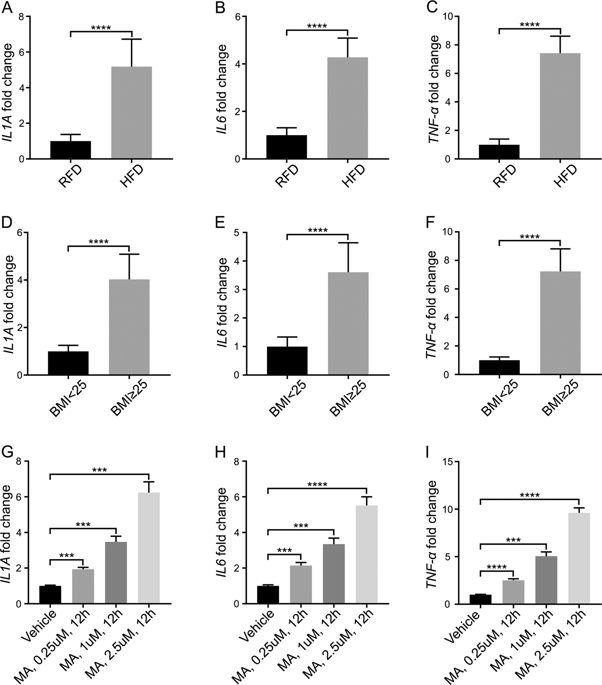当前位置:
X-MOL 学术
›
Prostate Cancer Prostatic. Dis.
›
论文详情
Our official English website, www.x-mol.net, welcomes your feedback! (Note: you will need to create a separate account there.)
Obesity-associated inflammation induces androgenic to estrogenic switch in the prostate gland.
Prostate Cancer and Prostatic Diseases ( IF 4.8 ) Pub Date : 2020-02-06 , DOI: 10.1038/s41391-020-0208-4 Bichen Xue 1, 2 , Shulin Wu 3 , Christina Sharkey 1 , Shahin Tabatabaei 3 , Chin-Lee Wu 3 , Zhipeng Tao 4 , Zhiyong Cheng 5 , Douglas Strand 6 , Aria F Olumi 1 , Zongwei Wang 1
Prostate Cancer and Prostatic Diseases ( IF 4.8 ) Pub Date : 2020-02-06 , DOI: 10.1038/s41391-020-0208-4 Bichen Xue 1, 2 , Shulin Wu 3 , Christina Sharkey 1 , Shahin Tabatabaei 3 , Chin-Lee Wu 3 , Zhipeng Tao 4 , Zhiyong Cheng 5 , Douglas Strand 6 , Aria F Olumi 1 , Zongwei Wang 1
Affiliation

|
BACKGROUND AND OBJECTIVE
Our patient cohort revealed that obesity is strongly associated with steroid-5α reductase type 2 (SRD5A2) promoter methylation and reduced protein expression. The underlying mechanism of prostatic growth in this population is poorly understood. Here we addressed the question of how obesity, inflammation, and steroid hormones affect the development of benign prostatic hyperplasia (BPH).
MATERIAL AND METHODS
We used preadipocytes, macrophages, primary human prostatic stromal cells, prostate tissues from high-fat diet-induced obese mice, and 35 prostate specimens that were collected from patients who underwent transurethral resection of the prostate (TURP). RNA was isolated and quantified with RT-PCR. Genome DNA was extracted and SRD5A2 promoter methylation was determined. Sex hormones were determined by high-performance liquid chromatography-tandem mass spectrometry. Protein was extracted and determined by ELISA test.
RESULTS
In prostatic tissues with obesity, the levels of inflammatory mediators were elevated. SRD5A2 promoter methylation was promoted, but SRD5A2 expression was inhibited. Inflammatory mediators and saturated fatty acid synergistically regulated aromatase activity. Obesity promoted an androgenic to estrogenic switch in the prostate.
CONCLUSIONS
Our findings suggest that obesity-associated inflammation induces androgenic to estrogenic switch in the prostate gland, which may serve as an effective strategy for alternative therapies for management of lower urinary tract symptoms associated with BPH in select individuals.
中文翻译:

肥胖相关的炎症在前列腺中诱导雄激素向雌激素转换。
背景与目的我们的患者队列显示,肥胖与2类固醇5α还原酶(SRD5A2)启动子甲基化和蛋白表达降低密切相关。对该人群前列腺生长的潜在机制了解甚少。在这里,我们解决了肥胖,炎症和类固醇激素如何影响良性前列腺增生(BPH)的问题。材料和方法我们使用前脂肪细胞,巨噬细胞,原代人前列腺基质细胞,高脂饮食诱导的肥胖小鼠的前列腺组织以及35份从经尿道前列腺电切术(TURP)的患者中收集的前列腺标本。分离RNA并通过RT-PCR定量。提取基因组DNA,并确定SRD5A2启动子甲基化。性激素通过高效液相色谱-串联质谱法测定。提取蛋白质并通过ELISA测试确定。结果在肥胖的前列腺组织中,炎性介质的水平升高。SRD5A2启动子甲基化被促进,但SRD5A2表达被抑制。炎性介质和饱和脂肪酸协同调节芳香化酶活性。肥胖促进前列腺中的雄激素向雌激素转换。结论我们的研究结果表明,肥胖相关的炎症在前列腺中引起雄激素向雌激素的转变,这可能是替代疗法的有效策略,可用于治疗选定个体中与BPH相关的下尿路症状。提取蛋白质并通过ELISA测试确定。结果在肥胖的前列腺组织中,炎性介质的水平升高。SRD5A2启动子甲基化被促进,但SRD5A2表达被抑制。炎症介质和饱和脂肪酸协同调节芳香化酶活性。肥胖促进前列腺中的雄激素向雌激素转换。结论我们的研究结果表明,肥胖相关的炎症在前列腺中引起雄激素向雌激素的转变,这可能是替代疗法的有效策略,可用于治疗选定个体中与BPH相关的下尿路症状。提取蛋白质并通过ELISA测试确定。结果在肥胖的前列腺组织中,炎性介质的水平升高。SRD5A2启动子甲基化被促进,但SRD5A2表达被抑制。炎症介质和饱和脂肪酸协同调节芳香化酶活性。肥胖促进前列腺中的雄激素向雌激素转换。结论我们的研究结果表明,肥胖相关的炎症在前列腺中引起雄激素向雌激素的转变,这可能是替代疗法的有效策略,可用于治疗选定个体中与BPH相关的下尿路症状。但SRD5A2表达受到抑制。炎性介质和饱和脂肪酸协同调节芳香化酶活性。肥胖促进前列腺中的雄激素向雌激素转换。结论我们的研究结果表明,肥胖相关的炎症在前列腺中引起雄激素向雌激素的转变,这可能是替代疗法的有效策略,可用于治疗选定个体中与BPH相关的下尿路症状。但SRD5A2表达受到抑制。炎症介质和饱和脂肪酸协同调节芳香化酶活性。肥胖促进前列腺中的雄激素向雌激素转换。结论我们的研究结果表明,肥胖相关的炎症在前列腺中引起雄激素向雌激素的转变,这可能是替代疗法的有效策略,可用于治疗选定个体中与BPH相关的下尿路症状。
更新日期:2020-02-06
中文翻译:

肥胖相关的炎症在前列腺中诱导雄激素向雌激素转换。
背景与目的我们的患者队列显示,肥胖与2类固醇5α还原酶(SRD5A2)启动子甲基化和蛋白表达降低密切相关。对该人群前列腺生长的潜在机制了解甚少。在这里,我们解决了肥胖,炎症和类固醇激素如何影响良性前列腺增生(BPH)的问题。材料和方法我们使用前脂肪细胞,巨噬细胞,原代人前列腺基质细胞,高脂饮食诱导的肥胖小鼠的前列腺组织以及35份从经尿道前列腺电切术(TURP)的患者中收集的前列腺标本。分离RNA并通过RT-PCR定量。提取基因组DNA,并确定SRD5A2启动子甲基化。性激素通过高效液相色谱-串联质谱法测定。提取蛋白质并通过ELISA测试确定。结果在肥胖的前列腺组织中,炎性介质的水平升高。SRD5A2启动子甲基化被促进,但SRD5A2表达被抑制。炎性介质和饱和脂肪酸协同调节芳香化酶活性。肥胖促进前列腺中的雄激素向雌激素转换。结论我们的研究结果表明,肥胖相关的炎症在前列腺中引起雄激素向雌激素的转变,这可能是替代疗法的有效策略,可用于治疗选定个体中与BPH相关的下尿路症状。提取蛋白质并通过ELISA测试确定。结果在肥胖的前列腺组织中,炎性介质的水平升高。SRD5A2启动子甲基化被促进,但SRD5A2表达被抑制。炎症介质和饱和脂肪酸协同调节芳香化酶活性。肥胖促进前列腺中的雄激素向雌激素转换。结论我们的研究结果表明,肥胖相关的炎症在前列腺中引起雄激素向雌激素的转变,这可能是替代疗法的有效策略,可用于治疗选定个体中与BPH相关的下尿路症状。提取蛋白质并通过ELISA测试确定。结果在肥胖的前列腺组织中,炎性介质的水平升高。SRD5A2启动子甲基化被促进,但SRD5A2表达被抑制。炎症介质和饱和脂肪酸协同调节芳香化酶活性。肥胖促进前列腺中的雄激素向雌激素转换。结论我们的研究结果表明,肥胖相关的炎症在前列腺中引起雄激素向雌激素的转变,这可能是替代疗法的有效策略,可用于治疗选定个体中与BPH相关的下尿路症状。但SRD5A2表达受到抑制。炎性介质和饱和脂肪酸协同调节芳香化酶活性。肥胖促进前列腺中的雄激素向雌激素转换。结论我们的研究结果表明,肥胖相关的炎症在前列腺中引起雄激素向雌激素的转变,这可能是替代疗法的有效策略,可用于治疗选定个体中与BPH相关的下尿路症状。但SRD5A2表达受到抑制。炎症介质和饱和脂肪酸协同调节芳香化酶活性。肥胖促进前列腺中的雄激素向雌激素转换。结论我们的研究结果表明,肥胖相关的炎症在前列腺中引起雄激素向雌激素的转变,这可能是替代疗法的有效策略,可用于治疗选定个体中与BPH相关的下尿路症状。



























 京公网安备 11010802027423号
京公网安备 11010802027423号